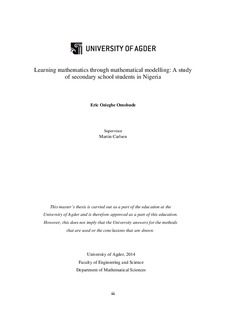| dc.description.abstract | The focus of this study is to investigate the impact that mathematical modelling activities may have in the learning process of mathematics amongst observed Nigerian secondary school students. I also wish to find out in what way mathematical modelling activities may help the observed Nigerian secondary school students to see the relevance of mathematics to real life. From a pedagogical perspective, I wish to examine if the application of modelling in the learning process of mathematics may be a vehicle for the enhancement and support of students' learning of mathematics as a subject. I started this thesis by looking at some past and present educational systems in Nigeria. This is to enable the readers to have an overview of Nigerian past and present educational systems. The data collection process involved ten senior secondary students from one of the public (government funded) senior secondary school in Lagos, Nigeria. At the beginning, I designed ten mathematical modelling problems for the observed students. But before the students started working with the tasks, I interviewed them to get their opinions first about mathematics as a subject, secondly their opinions about the way they were currently learning mathematics and thirdly, their opinions about the connection between the mathematics they are learning in the classroom and the real life use of mathematics outside their classrooms. This pre-interview session was followed by some engagement of the observed students with the ten modelling problems that I prepared for them although I solved two of the problems for the students as examples. This process lasted for three days. In the end, I again interviewed the same observed group of students so as to get their feedback/opinions about the modelling activities they went through in the past three days. The emphasis at this point was to check the impact this modelling activities have had on the observed students’ learning process. In Nigeria, secondary school students are taught mathematics in an authoritarian and traditional way. By this, I mean teacher-centred and lecture-based learning approach that only emphasizes the solving of exercises that must lead to correct answers. The consequence is that students are rarely shown or asked to link any mathematical problem to real life situations (modelling). This impression results from my personal experience at different stages of the Nigerian secondary school mathematics education system. In an effort to investigate the students’ learning process in mathematics and perhaps increase their interest in the discipline, alternative learning approaches that might offer different experience to students, may be introduced. My research follows this basis within the framework of Nigerian secondary school. | nb_NO |
